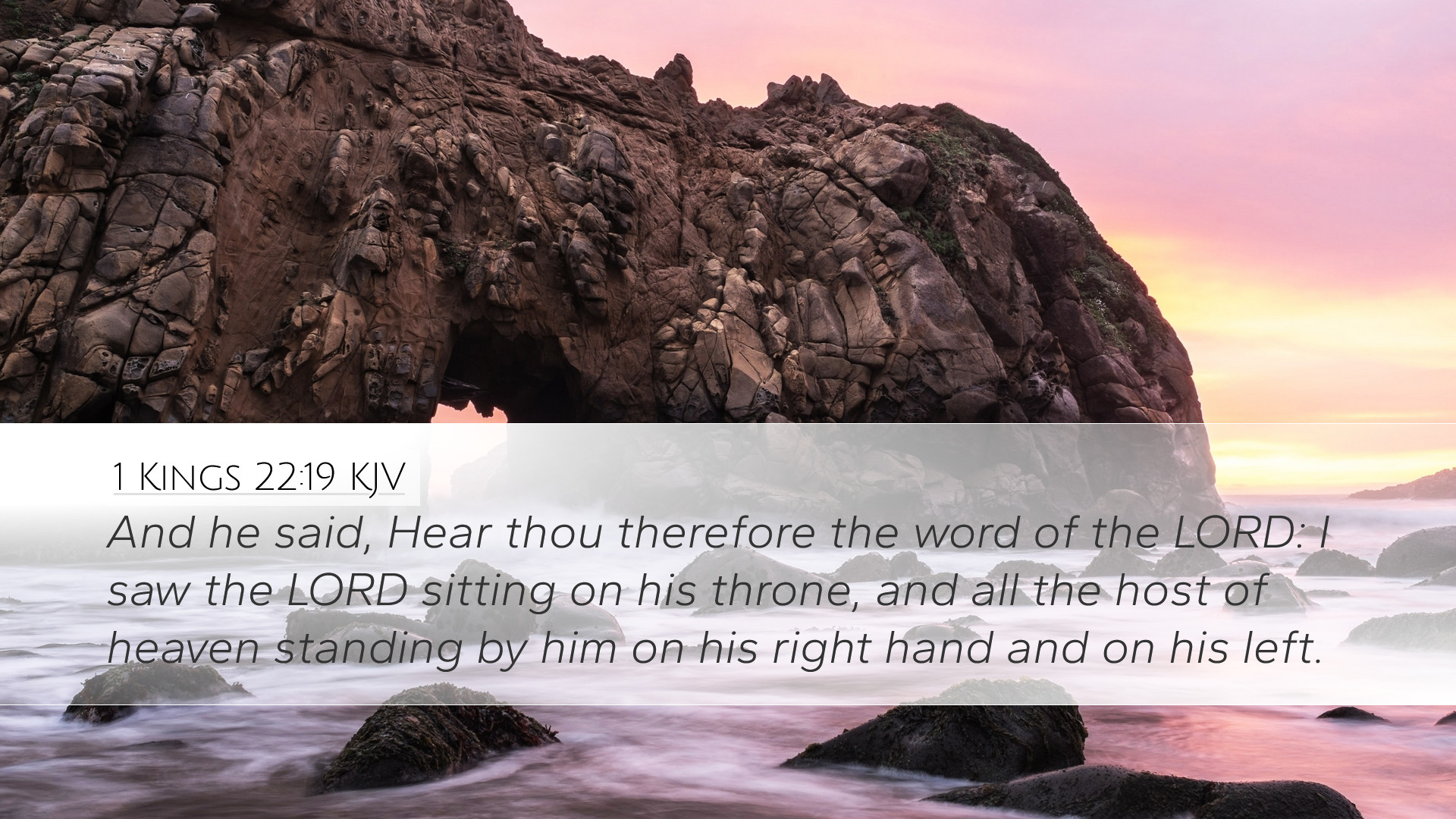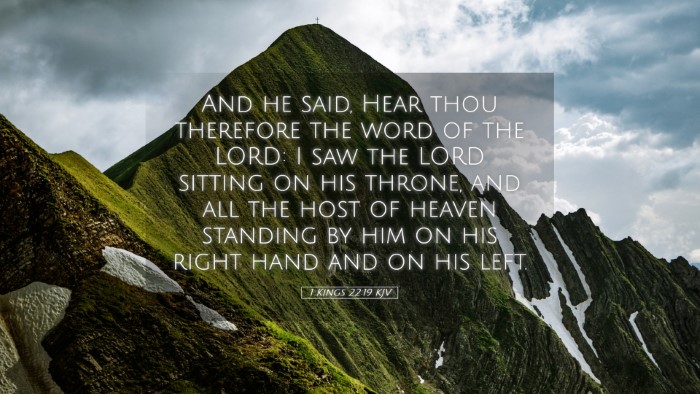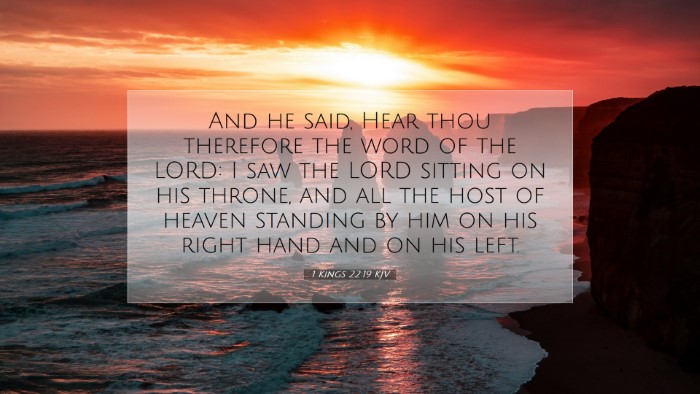Commentary on 1 Kings 22:19
Verse Reference: 1 Kings 22:19 - "And he said, Hear thou therefore the word of the LORD: I saw the LORD sitting on his throne, and all the host of heaven standing by him on his right hand and on his left."
Introduction
This profound verse comes from the narrative of Micaiah, a prophet speaking to King Ahab and Jehoshaphat. The scene depicted in this verse is crucial in understanding God’s sovereignty and the nature of divine counsel. It is essential for biblical scholars, pastors, and students of theology to grasp the depth of the implications contained within this vision experienced by Micaiah, as it showcases the majesty of God and the intricate workings of divine providence and agency.
Divine Majesty and Authority
Micaiah’s vision reveals God seated on His throne, symbolizing His supreme sovereignty. This imagery is critical as it highlights the immutable nature of God’s rule over both heaven and earth. As emphasized by Matthew Henry, the throne is a mark of authority, upon which “He rules with the utmost wisdom and righteousness.”
Albert Barnes expands on this thought by asserting that the depiction of God on His throne illustrates that, despite human scheming and the tumult of worldly affairs, God's overarching governance is constant and unwavering. This aspect serves as a reminder for Christians to trust in God’s plans amid uncertainties.
The Host of Heaven
The presence of "all the host of heaven" in this vision signifies the angelic beings and spiritual forces that serve God’s purposes. Adam Clarke interprets this as a representation of divine order, where every being has its place and function in the heavenly realm. He states, “The vast and glorious assembly stands at God’s command, awaiting His instruction.” This dynamic illustrates that God is never alone in His administration of justice; He has hosts to execute His will.
Roles of the Heavenly Host
- Advisory Role: The heavenly beings serve as an advisory council, emphasizing God's involvement in human affairs.
- Execution of God’s Will: They are instruments for carrying out divine judgment or mercy, indicating the cooperative nature of divine providence.
- Encouragement for Believers: The existence of such a host provides assurance to believers that they are not alone in their struggles; divine assistance is ever close.
Theological Implications
This verse raises profound theological inquiries regarding the nature of God’s communication with humanity. Matthew Henry suggests that God, in His majesty, chooses to reveal His plans and purposes to those whom He called, such as prophets. This indicates the intimacy and personal nature of God’s relationship with His chosen instruments.
Albert Barnes further discusses the importance of prophetic revelation, asserting that it is a vehicle through which God's truth is communicated. The vision serves as a crucial reminder that God orchestrates all events for His glory and purposes, even when circumstances appear bleak or chaotic.
Understanding Prophecy and Revelation
Micaiah's prophetic vision also invites a deeper exploration of the nature of prophecy itself. Adam Clarke provides insight into the varying forms of prophecy throughout Scripture, noting that the types of revelations may differ depending on God's plan and the prophet’s role. Micaiah exemplifies the courageous prophet willing to speak truth to power, serving as a model for contemporary ministers and theologians.
Characteristics of True Prophecy
- Courage: True prophecy requires boldness to speak the truth, even when it is unpopular.
- Clarity: Divine messages delivered through God’s prophets are often clear and unequivocal, calling for action or repentance.
- Alignment with God’s Will: True prophecies align with God’s overarching narratives found throughout Scripture.
Application for Today
The vision in 1 Kings 22:19 offers timeless applications for modern-day believers and leaders. The awareness of God’s sovereignty should shape their worldview, encouraging reliance on divine guidance in decision-making. In a world filled with competing voices, recognizing the voice of God as supreme is paramount.
Furthermore, understanding our role in God’s plan as part of His "host" calls believers to action—encouraging them to be vigilant in prayer, seeking God’s wisdom and guidance as they navigate life’s complexities. Matthew Henry comments on the necessity of being in tune with God’s Spirit, urging believers to “stand ready to perform their duty in the heavenly army” of God’s kingdom.
Conclusion
The rich imagery and profound truths encapsulated in 1 Kings 22:19 serve as a reminder of God’s sovereignty, the roles of the heavenly hosts, and the nature of prophetic ministry. The insights provided by Matthew Henry, Albert Barnes, and Adam Clarke elucidate the significance of this verse for pastors, scholars, and everyday believers, urging them to recognize the majesty of God seated on His throne while calling them to partake in His divine purposes.


